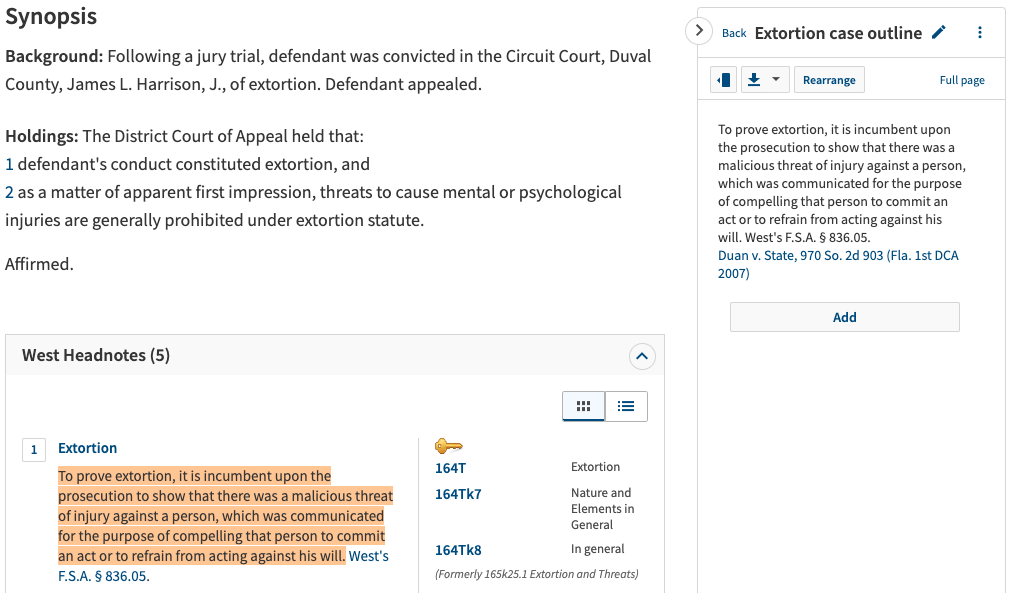Extortion is one of the legal ideas that affect marriage and family law that is most frequently employed, misused, misunderstood, and ignored. Criminal matters are frequently brought up in family law proceedings, but they do so subtly that they are either ignored or seen as a natural aspect of the conflict.
In this article, we will briefly discuss cause of action (CoA) for extortion in Florida, its elements along with case studies.
Jump to ↓
What is the cause of action for extortion in Florida?
One of the most popular cases on extortion in South Florida
Can you sue for extortion in Florida?
What are the elements of extortion in Florida?
Case example where extortion was not recognized: Crossdale v. Crossdale
Case example where extortion was recognized: Duan v. State

CoCounsel Legal
AI, trusted content, and expert insights about claims from Westlaw and Practical Law
Jumpstart legal research ↗What is the COA for extortion in Florida?
According to Florida Statute 836.05, extortion is a crime committed when someone knowingly threatens to accuse someone of any crime or infraction or harm another’s person, property, or reputation or expose another to embarrassment, reveal a secret that might hurt another or assign someone a defect or a lack of chastity.
Extortion is with the intent to demand money or any other form of financial advantage, or any person against their will forced to perform an action or stop from performing one.
One of the most popular cases on extortion in South Florida
In 2018, many people in South Florida were interested in “The Jills” and their competitor broker Kevin Tomilson when the specifics of their legal dispute were made public. A long-running battle that included lavish residences, big sums of money, and lots of drama came to a close with one person facing up to 30 years in prison for extortion.
Kevin Tomilson was arrested and accused of extortion of Jill Hertzberg and Jill Eber. The Jills had been manipulating their listing on the Multiple Listing Service (MLS) website used for real estate agents and brokers. When they presented him with a check for $400,000 to make his threat go away, he demanded double and was subsequently arrested.
Can you sue for extortion in Florida?
CoA arises in extortion where with malicious intent the defendant causes injury to the plaintiff by forcing or compelling the latter to do or to abstain from doing an act against the will of the plaintiff. Penalties for extortion are mentioned hereunder:
- In Florida, extortion is classified as a second-degree felony and carries a maximum sentence of 15 years in prison, 15 years of probation, and a $10,000 fine.
- According to Florida’s Criminal Punishment Code, extortion is classified as an offense with a Level 6 severity rating.
- When someone is found guilty of extortion, the court has the option of giving them probation or the maximum term allowed by law, which is 15 years in prison.
What are the elements of extortion in Florida?
The following are the elements of extortion in Florida:
- Threat: The prosecution must establish that the defendant made a written or verbal threat. If the victim does not comply, the threat may be followed by bodily harm, death, or even psychological harm to the victim, to another person, or to property. Alternatively, the defendant could make a threat to divulge a secret, charge the victim with a crime, or otherwise jeopardize the reputation of the person being threatened. According to Florida law, the defendant may make threats to commit either a legal or illegal act. As long as the prosecutor can demonstrate that the defendant behaved deliberately, extortion may involve the threat of judicial action.
- Intent: The prosecution must demonstrate that the offender intended to take advantage of the victim’s helplessness by forcing them to perform acts against their will, receive property, or for some other reason. The ability to carry out the threatening act or the intention to do so are not, however, requirements under Florida law.
Duan v. State, in this case, the State must establish each of the following four factors without a shadow of a doubt in order to establish the extortion crime:
- Defendant communicated with the plaintiff orally, in writing, or both.
- Through this contact, the defendant unlawfully threatened to harm the plaintiff.
- The threat was made intentionally;
- The threat was made with the intention to extract money or any other financial benefit.
The threat made by the defendant was malicious and made with the goal to coerce another person into performing an act against their will or refraining from performing an act in exchange for money or other forms of financial gain.
In Alonso v. State, 447 So.2d 1029, 1030 (Fla. 4th DCA 1984):
The offense of extortion does not include actual malice. The fundamental components of the law are a malicious threat issued with the intention of compelling someone to do something against their will. If the threat is issued “willfully and purposefully to the detriment and harm of another…,” the threshold for malice is met (4th edition of Black’s Law Dictionary). Malicious threats are those that are made knowingly and without a valid reason. It establishes the crime of extortion when combined with the necessary purpose.
Case example where extortion was recognized: Duan v. State
Facts:
- Michael Crossdale, the brother of Errol Crossdale, filed a lawsuit against him in 2010 in a Florida state court, alleging that he had unlawfully acquired the deed to Michael’s home in Cape Coral.
- The Florida trial court decided in favor of Michael in two different verdicts. Errol was ejected from the property and the first granted silent title. Errol took the decisions under appeal to the Second District Court of Appeal, which upheld them. Errol filed an appeal against the ruling with the Florida Supreme Court, which dismissed it.
- Errol went to federal court in search of a new beginning after having used up all his options in state court. The Middle District of Florida received his pro se lawsuit on August 23, 2013. The defendants included in his second amended lawsuit were his brother Michael, Stacy Bianco, James Bianco, Patricia Crossdale, Linda Worth, and Worthit Realty, LLC.
- The second amended complaint also had eight counts. For racketeering, extortion, theft by deception, conversion, collusion, violations of due process, conspiracy, and fraud, the complaint demanded monetary damages.
- The main charge was that “Defendant Michael A. Crossdale wrongfully utilized the [Florida state] court to scam, swindle, and defraud Errol out of money and property.” Errol allegedly experienced harm in each count as a result of the verdict in the state court case.
- The defendants moved to dismiss the complaint on the ground that, under the Rooker–Feldman doctrine, the district court lacked subject matter jurisdiction to hear the case. The district court agreed and dismissed the case and on that ground. Errol went for appeal.
Judgment:
The court held that the district court correctly determined that it did not have jurisdiction under the Rooker–Feldman doctrine. The state court’s decision became final no later than July 18, 2013, which was a month before Errol filed his federal complaint. Errol also contends that the state court judgments resulted from fraud on the court and should thus be exempted from this doctrine.
Case example where extortion was not recognized: Crossdale v. Crossdale
Facts:
- The original plaintiff shared with the defendant that her husband was abusive and is on trial in a court of law. The defendant and plaintiff used to work together, thereafter the communication of the plight by the plaintiff to the defendant increased their social meetings which resulted in the defendant falling in love with the plaintiff.
- When the defendant expressed her feeling the plaintiff refused, moreover she resisted any further social meetings.
- In order to take revenge, the defendant extorted her by saying that the witness in her husband’s case will not say anything against her husband. As a result, he will be acquitted by the court unless and until she pays a certain amount.
- Thereafter, the plaintiff met the defendant and recorded all their conversations and filed a case against the defendant with the charge of extortion.
- The court found him guilty and convicted him of the same. He filed an appeal on the basis that there was no physical injury caused to the plaintiff therefore the trial court has erred in convicting the defendant.
Source: Duan v. State of Florida case report using Westlaw Precision with CoCounsel.
Judgment:
The defendant/appellant for a judgment of acquittal following the State’s case, claiming the State had not proven all elements of extortion. He argued that the victim merely experienced a mental injury, or an injury to her emotional well-being, and that there was no proof that he physically threatened her, indicated harm to her property, or otherwise threatened to divulge a secret or destroy her reputation. According to the appellant/defendant the victim’s mental harm was insufficient to satisfy the requirements for extortion as stated in Florida Statutes section 836.05.
It was observed that, it is the responsibility of the prosecution to demonstrate that there was a malicious threat of harm against a person that was transmitted to compel that person to act against his will or stop from acting to prove extortion. Additionally, while though generally speaking, a claim of extortion cannot be based on a threat to carry out an act that a person has a legal right to do, one may not threaten to carry out an otherwise legitimate act to further his own financial interests.
Extortion occurred when the defendant threatened the victim and caused her emotional distress by claiming that he knew of several witnesses who had been subpoenaed to testify at her husband’s domestic violence trial and that he would ensure his acquittal unless she agreed to pay him. The District Court of Appeal determined that the defendant’s actions constituted extortion and that threats to inflict harm were apparent as well as it was opined that under the extortion statute, mental or psychological harm is generally forbidden.
Conclusively it was held that the trial court did not err by denying the defendant’s motion for acquittal. Moreover the judgment observed that and instructing a threat to a person’s mental well-being can constitute a threat of injury to a person within the meaning of extortion, an injury to a person is not required to be a physical injury.
The many settings for extortion claims
Extortion can simply be explained as the forceful act done or abstained from doing by the plaintiff because of the threat given by the defendant for monetary or financial benefits in return.
There are various areas where extortion could be observed such as in commercial or business cases, family cases, property cases etc. It ranges from blackmail to cyber extortion. Extortion claims are frequent in the workplace and are categorized as white-collar crimes. Other extortion allegations occur in a domestic setting between ex-lovers and might be categorized as a crime of passion or domestic violence. The CoA for extortion is sufficed wherever all the elements of extortion are present.

CoCounsel Legal
Work smarter with CoCounsel, seamlessly integrated with Westlaw, Practical Law, Microsoft 365, and DMS partners
Go professional-grade AI ↗






